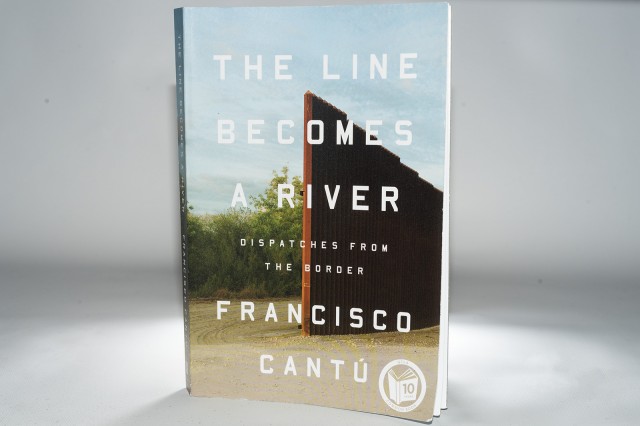This year’s Common Book author agreed to donate half of his speaker’s honorarium profits to undocumented students at UCLA after students and faculty criticized him for profiting off the stories of immigrants at the southern border.
Francisco Cantú is the author of “The Line Becomes A River,” this year’s UCLA Common Book. The Common Book program selects a book every year for students to read and discuss. Cantú’s memoir details his experiences as a U.S. Border Patrol agent and his struggle to make a positive impact while working in what he thinks is a flawed system.
Students and faculty have expressed concerns about the author’s involvement in the border patrol since the book was selected.
Charlene Villaseñor Black, a professor of art history and Chicana and Chicano studies, said many members of the UCLA community felt selecting Cantú’s book this year was inappropriate because of controversial incidents that have occurred at the border, such as the separation of children from their families. She said people also felt it was insensitive to select a book written by a border patrol agent.
“We have too many students who have experiences with the border patrol that are very close in their family histories,” Villaseñor Black said. “It was not something that I felt comfortable asking students to read.”
Villaseñor Black said this was the first Common Book that focused on the Latinx experience, but added she did not think it was the most suitable choice.
“Since the presidential elections, the anti-Latino and anti-immigrant rhetoric is at a fever pitch in the United States,” Villaseñor Black said. “I understand the impulse to confront difficult issues and want to talk through them, but I felt like the timing was not good.”
She wrote an open letter to Cantú on Jan. 31 after several students and faculty members approached her with their concerns. She detailed the concerns of the campus in the letter and asked Cantú to consider donating his profits from speaking at UCLA to UCLA’s Undocumented Student Program.
“(Cantú should) consider what it means to profit in part from the stories of those the border patrol has deported, from the families it has separated, from the individuals whose hope for a better life it has crushed,” Villaseñor Black said in the letter.
Cantú agreed to donate half of his $10,000 earnings to the USP, and half to the education of the children of an undocumented man mentioned in his book, according to a letter Cantú sent in response to Villaseñor Black’s letter.
“If such invitations have not yet been extended to members of the (USP) and other interested student organizations, I’d like to personally welcome them to take part in the Common Book event by tabling, disseminating information, sharing the microphone, the stage, or participating whatever way may be appropriate,” Cantú said in the letter.
Cantú added in the letter he encourages students to continue a dialogue on campus about these concerns.
“It is not lost on me that, even in renouncing the structures of violence of which I was a part, the commodification of the stories that stem from that period in my life cannot be untethered from the damaging work I was engaged in,” Cantú said in his letter.
Cantú said in a statement that he routinely donates his speaker fees to organizations that aid in immigrant advocacy at the southern border.
He added this is not the first time he has faced controversy regarding his book and that he always welcomes and tries to learn from criticism.
“What is important to me isn’t that my voice gets heard or that my book gets read, but that a larger platform is extended to those who are most affected by border issues – migrants themselves – so that their experiences can be seen and heard directly from them,” Cantú said.
Paolo Velasco, director of the Bruin Resource Center, which houses the USP, said he had also received concerns from UCLA community members regarding the Common Book. He said his office learned about the donation through Villaseñor Black and Cantú’s letters.
“I really want to be clear that the donation is not something we asked for or had any role in securing,” Velasco said. “We’ll look and see how we can utilize it to best support our students.”
La’Tonya Rease Miles, director of the First Year Experience and coordinator of the Common Book, said she invited the USP and other student organizations to participate in a campuswide discussion about concerns regarding the book, but added these groups did not respond to her invitation.
She said the Common Book selection process began in March 2018. The Common Book Selection Committee, which consists of faculty members, students and UCLA community members, selects the book each year.
Rease Miles said the committee did not anticipate the political tension surrounding the border would intensify this rapidly when they first chose the book.
“This book gave us the best opportunity to have a conversation about, No. 1, immigration, No. 2, career choice and decision-making,” Rease Miles said. “Those are the things that were on our mind when we selected this book.”
She said she encourages students and faculty to join the Common Book committees for the upcoming year.
“If people are interested whether it’s because they are pissed off about the book or excited, they should consider joining and nominating a text or even joining a committee,” Rease Miles said.

